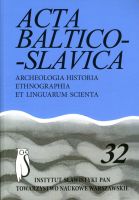Этимологические заметки по древнерусской ойконимии. Часть II. – Названия с антропонимическими основами
Etymological remarks on the Old-Russian toponymy. Part II – Names with anthropological stems
Author(s): Maksim A. JujukinSubject(s): Language and Literature Studies
Published by: Instytut Slawistyki Polskiej Akademii Nauk
Keywords: old Russian language; chronicles; etymology; place name; personal name
Summary/Abstract: In the second part of the article the origin of some place names mentioned in Old Russian chronicles and derived from personal names is considered: Воронач (Voronach) (and other forms) < Воронъ ‘raven’ + the formant * ačь; Гостень (Gosten’) < Гостенъ ( а) + the possessive formant * jь; Дубечин (Dubechin) < *Дубека (this name is not attested, but both the stem дуб ‘oak’ and the suffix ека occur in the Old Russian anthroponomastics) + the formant ин ; Кличен (Klichen) < Кличь (< кличати ‘shout, cry (out)’) + the formant ьн ; Коложе (Kolozhe) < Колода (< колода ‘log, tub, etc.’) + the formant * j ; Лыщиково (Lyshchikovo) < Лыщикъ (< лыскати ‘smile’) + the formant ов ; Онеги Спасские и Юрьевские (Onegi Spasskie I Yur’yevskie) < *Онhгъ – the hypokoristic derivative from the compound anthroponym like *Něgomirъ, *Něgoslavъ, *Něgovojь with the prothetic O – in the plural form (the existence of this name is confirmed by the fact, that the possessive adjective, derived from it, has been kept in the anoikonym (О)нhгова поляна); Рознеж (Roznezh) < Рознhг(ъ), attested only in one of the Novgorod birch letters, + the formant * jь, and others.
Journal: Acta Baltico Slavica
- Issue Year: 2008
- Issue No: 32
- Page Range: 43-50
- Page Count: 8
- Language: Russian

